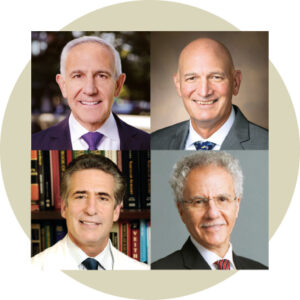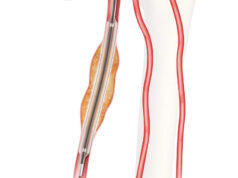
As vascular surgeons advance in their careers, many begin to consider alternative professional paths that draw upon their clinical expertise, while offering greater flexibility, intellectual stimulation or new challenges outside the traditional confines of full-time clinical practice. Whether motivated by physical demands, shifting professional interests or a desire to contribute in new ways, seasoned vascular surgeons have a wide array of fulfilling and impactful options. These career directions are open to those from clinical, academic or hybrid backgrounds.
1. Clinical research and leadership in clinical research organizations
Experienced vascular surgeons often move into roles centered on clinical research. Their procedural knowledge and understanding of patient care position them well to serve as principal investigators or advisors within clinical research organizations (CROs) or their academic-based counterparts, academic research organizations (AROs). Responsibilities in these roles span protocol development, site selection, safety endpoint adjudications, evaluation of study outcome data, review of core laboratory images, and assisting with the overall operational aspects of the clinical trial.
In AROs and CROs, surgeons can advise on regulatory and scientific strategies for clinical studies and can ensure that trials measure outcomes and endpoints that truly matter to patients and clinicians. Awareness of clinical workflows enables the identification of practical challenges a priori, helping to develop realistic, relevant study designs that avoid impediments to efficient enrollment and adequate patient follow-up. These positions are frequently structured for part-time or hybrid work and may be performed remotely.
2. Part-time or locum tenens practices
In later years, a surgeon may wish to continue clinical practice, but at a slower pace or with reduced call commitments. This may be accomplished by moving to a remote hospital setting affiliated with a larger healthcare system. With the shortage of vascular surgeons expected to worsen over the next decade, this option offers community and physician benefits. Many practices would welcome even part-time coverage or assistance. Further, there may be opportunities to assist in the outpatient setting in a larger practice or to see patients in an outreach clinic. Sharing a practice with either another senior peer or, alternatively, a younger surgeon who may have significant out-of-hospital personal commitments may satisfy a desire for both individuals to stay clinically active at a desirable, individualized pace. Sometimes these arrangements can be done with periodic travel so that the senior surgeon can maintain their current residence.
3. Transition to non-operative practice
As senior vascular surgeons contemplate transitioning to retirement, they may consider alternatives short of completely leaving their practice. One such alternative is to shift to a solely office-based, non-operative practice. This approach is less technically and physically challenging and can be done on either a full- or part-time basis. An office-based practice allows senior vascular surgeons to continue to be involved with patient care, utilizing their vast experience and wisdom to evaluate and nonoperatively manage patients.
By referring patients who require interventions or open surgical procedures to practice associates, senior vascular surgeons can increase the overall efficiency of the practice and enhance physician satisfaction. Additionally, performing office-based minimally invasive procedures—for instance, venous procedures or wound care—can bring personal fulfillment while providing a continued source of income.
4. Academic teaching and mentorship
Education remains a natural extension for many vascular surgeons. For some, teaching residents and fellows was always a part of their responsibilities. As clinical responsibilities diminish, there’s an opportunity to expand this role. Senior surgeons may take on responsibilities as clinical faculty, giving student and resident lectures, bedside teaching on patient rounds, and participating in simulation training. Some academic institutions are open to part-time faculty appointments, making this an attractive option for surgeons to ease into semi-retirement. In some academic systems, senior surgeons can act as mentors or coaches for junior faculty to help guide younger surgeons’ academic, teaching or clinical careers. In addition, as junior surgeons may struggle with entering clinical practice, having a senior surgeon to assist with complex operations may be a role that provides professional fulfillment for a senior surgeon, and real value to the more junior surgeon and the healthcare organization.
Separate from face-to-face interactions, teaching can also take the form of medical writing and engaging in contributions to literature in the form of white papers, original research articles or chapters in textbooks.
5. Board and advisory services in healthcare organizations
Vascular surgeons increasingly contribute to governance roles on hospital boards, nonprofit foundations, health systems and professional societies. Their clinical insight can offer invaluable perspective to discussions on quality improvement, strategic direction and innovation. These roles often involve participation on quality or finance committees, or advisory input on clinical initiatives. Structured as part-time commitments, these roles can provide meaningful engagement without the demands of full-time clinical practice. Working for non-healthcare non-profit organizations or local community organizations can be equally rewarding.
Surgeons can also serve roles in larger healthcare systems by providing guidance and oversight for specialty care at regional practices where they exist. There are also often roles for individuals to oversee pricing and product standardization across a healthcare system. In addition, surgeons have long considered the electronic medical record (EMR) as a barrier to patient care efficiencies. Leveraging clinical experience to enhance the EMR can be a service well appreciated by all stakeholders in the system.
6. Medical director positions in startup medical device and biotechnology companies
Some vascular surgeons move into entrepreneurship—founding companies or advising early-stage ventures. Many early-stage companies seek part-time medical directors with firsthand clinical experience. Vascular surgeons are especially valued in companies developing endovascular tools, imaging platforms or artificial intelligence (AI)-enabled solutions. These engagements may be structured as short-term projects or long-term relationships, and often align well with surgeons who enjoy innovation, collaboration and problem-solving.
These positions are often remote, involve minimal travel and offer compensation through consulting fees, equity, or both. Surgeons in these roles influence clinical trial design, user interface development and postmarket strategies. They also often contribute to fundraising pitches, serve as key opinion leaders, and guide regulatory or reimbursement planning.
7. Executive medical leadership at large medtech companies
Some surgeons take on full-time leadership roles within major medtech firms—such as divisional chief medical officers or medical affairs directors. Responsibilities may include global trial oversight, regulatory engagement, physician education and management of key opinion leader networks.
These positions require strong communication skills and the ability to collaborate across clinical, engineering and commercial functions. In some roles, surgeons may assist in the management of clinical studies, or guide direction outside of their primary specialty, working with physicians across specialties and procedures. Though demanding, these roles allow surgeons to influence device strategy and patient care. Surgeons in these roles often serve as a critical link between practicing clinicians and corporate leadership, ensuring that innovation remains clinically grounded.
8. Regulatory service with the FDA
An often-unrecognized path is service within the Food and Drug Administration (FDA), either on a full- or part-time basis. The Center for Devices and Radiological Health (CDRH) routinely recruits physicians with domain-specific expertise to review premarket submissions, participate on advisory committees (panels), and guide the design of postmarket surveillance study design.
Vascular surgeons bring a unique ability to critically evaluate clinical evidence while understanding device function in real-world practice. Opportunities at the FDA include full-time roles or work as special government employees (SGEs) on a consulting basis.
9. Legal consulting and expert witness services
Legal consulting is another avenue that allows surgeons to remain intellectually engaged while working flexibly. Vascular surgeons may offer litigation support, conduct case reviews, or testify in malpractice or patent-related legal matters. Since this work mandates maintenance of at least part-time clinical activities, it is a nice option for surgeons interested in a transition out of full-time practice.
These roles appeal to those who enjoy applying clinical knowledge in high-stakes analytical contexts and can be pursued independently or through legal advisory networks. However, the choice of working exclusively for plaintiffs or defendants can sometimes create personal or ethical conflicts. Attorneys may exploit such decisions by questioning a surgeon’s impartiality before a jury, underscoring the importance of consistency, transparency and preparation in this line of work.
10. Insurance adjudication and utilization review
Another growing area of opportunity for senior vascular surgeons is in the insurance and healthcare payor sector. In these roles, surgeons participate in the adjudication of claims and conduct utilization reviews to assess the appropriateness and necessity of vascular procedures and hospital stays. With their deep clinical experience, surgeons can evaluate the medical justification for treatments and ensure alignment with evidence-based guidelines.
These positions can be structured on a part-time or consulting basis and are almost always performed remotely.
Conclusion: Designing a fulfilling late career
Vascular surgeons are not confined to a binary choice between clinical practice and full retirement. The options outlined here are not the only choices available, and the choices one has to transition a career are continuing to expand. An increasing range of meaningful, intellectually rich, and flexible roles are available for those who wish to remain active contributors in the field.
It is also important to recognize that a senior surgeon need not be limited to a single, ultimate career transition choice.
Kenneth Ouriel, MD, is executive vice president of medical device contract research organization NAMSA in New York; Daniel Clair, MD, is chair and professor of vascular surgery at Vanderbilt University Medical Center in Nashville; Alan Dietzek, MD, is chair of vascular surgery at Jersey Shore University Medical Center in Neptune, New Jersey; and Enrico Ascher, MD, is a clinical professor of surgery at New York University.












